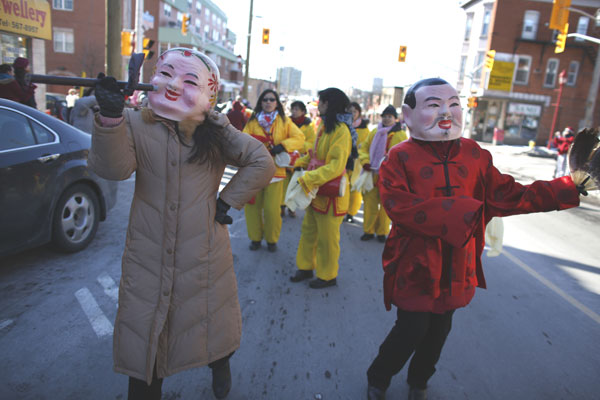Traditional holidays for a modern China
By Su Zhou (China Daily) Updated: 2015-02-06 07:30
|
As Spring Festival becomes increasingly popular overseas, more countries are organizing Chinese New Year-inspired events to attract local residents and Chinese visitors. Photos Liu Yilin and David Kawai / Xinhua |
Outward bound
More than half of those polled said they wanted to spend the vacation overseas, marking the first time that the number of people planning trips abroad has exceeded those aiming to travel domestically.
Dai Yu, Ctrip's marketing director, said the Spring Festival will very likely witness the largest number of people that have ever headed overseas for the holiday, and bookings for popular destinations abroad could outstrip the same period last year by at least 50 percent.
According to Liao Weiyong, chief operating officer of Aoyou, an online booking agency operated by the China Youth Travel Service, sales of travel products for the holiday have been rising rapidly since mid-December, and bookings for outbound packages have significantly surpassed domestic ones.
"The sales of overseas travel products are expected to grow by at least 70 to 80 percent while those for domestic tourism will increase by 40 percent," he said.
Destinations in Asia are the top draws for the Chinese market, with South Korea and Thailand at the top of the list, while Japan, the United States, New Zealand and Europe are also popular.
Neighboring countries and regions that have introduced favorable visa polices for Chinese tourists are also expected to see more visitors than before.
Within China, Taiwan remains a major attraction. On Jan 15, more tourists from the Chinese mainland applied for travel permits to the island than on any other day in the run-up to the New Year travel season so far.
According to the local media, the February holiday could be "especially crowded" this year, because almost 46,500 people have applied for entry permits - about five times the number of Chinese mainland visitors allowed into Taiwan every day - but many will probably only be able to visit the island once the holiday wanes on Feb 23.
"The sound economy, favorable visa policies, and the appreciation of the yuan are the major reasons behind the boom in outbound tourism during Spring Festival," said Zhang Guangrui, honorary director of the Tourism Research Center at the Chinese Academy of Social Sciences.
"Changes in visa policies are really helping tourism. In the past, people had to prepare months in advance for a trip overseas. Now, with more countries and regions supporting visa-on-arrival or even visa-free measures for Chinese tourists, it's becoming easier to travel as a family," he said.
"Attitudes toward Chinese New Year have also changed. In the past, people insisted that a family reunion meant family members stayed together in their parents' home and dined together. That's why Spring Festival can look like a battlefield for some people who work far from their hometowns and want to book a ticket home. Now, things have changed. People have started to accept the idea that families can have a good time anywhere, just so long as they are together," he said.
For Pan Lichao, 29, a researcher with a multinational company in Beijing, the problem is one of balance. "A lot of my friends are the only children of their families, and after getting married, many people, including me, face the same dilemma during the festival: which set of parents should we visit, and for how long? In my opinion, family travel is the best way of solving the problem."
- Govt encourages people to work 4.5 days a week
- Action to be taken as HIV cases among students rise
- Debate grows over reproductive rights
- Country's first bishop ordained in 3 years
- China builds Tibetan Buddhism academy in Chengdu
- Authorities require reporting of HIV infections at schools
- Typhoon Soudelor kills 14 in East China
- Police crack down on overseas gambling site
- Debate over death penalty for child traffickers goes on
- Beijing to tighten mail security for war anniversary








